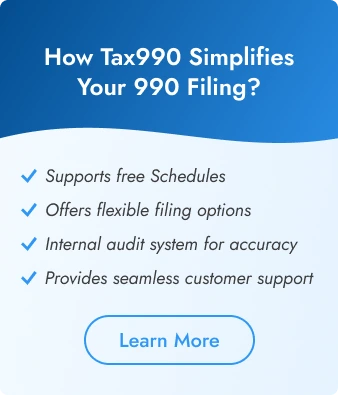What Should Charitable Risk Pools Know About Form 990 Filing?
- Updated August 14, 2023 - 2.00 PM - Admin, Tax990
There are numerous classifications of Nonprofits available based on their primary purpose and how they operate. Based on their classification, the IRS provides tax exemption for these nonprofits under different
IRC sections.
This article elaborates on Charitable Risk Pools, how they can obtain tax-exempt status, and what their 990 filing requirements are.
Table of Contents
How Does the IRS Define Charitable Risk Pools?
As per the IRC Section 501(n), Charitable Risk Pools are organizations that are established and operated primarily to pool the insurance risks of their members and to provide information to their members in regard to loss control and risk management.
The members of Charitable Risk Pools must be an organization that obtained federal tax exemption under the IRC section 501(c)(3). These organizations must also meet the requirements of section 501(c)(3) such as,
- Must be operated towards any exempt purposes
- Limited participation in political and lobbying activities
- No part of the net earnings should benefit any private individual.
How Can Charitable Risk Pools Trusts Apply for Tax Exemption?
The Charitable Risk Pools that need to obtain federal tax exemption under the IRC section 501(n) are required to file Form 1023 - Application for Recognition of Exemption Under Section 501(c)(3) of the Internal
Revenue Code
They may also be eligible to file Form 1023-EZ based on their answers on the eligibility worksheet. For more information, visit here.
What are the 990 filing Requirements for 501(n) Charitable Risk Pools?
The 501(n) Charitable Risk Pools are exempt from paying federal income taxes. However, they are obliged to report their organization’s financial status and activities over the tax year annually. They must file 990 Series forms every year to ensure the same.
Following are the different types of 990 forms available, and the Charitable Risk Pools can choose the applicable one.
Form 990-N - Filed by organizations with gross receipts less than or equal to $50,000.
Form 990-EZ - Charitable Risk Pools with gross receipts less than $200,000 and assets
less than $500,000.
Form 990 - Charitable Risk Pools with gross receipts of $200,000 or more (or) assets of $500,000 or more.
Additional Filing Requirements for Charitable Risk Pools
Based on the details reported on their 990 or 990-EZ, Charitable Risk Pools may be required to report additional information by attaching Schedules.
If the Charitable Risk Pools file Form 990 or 990-EZ and have an Unrelated Business Income (UBI) of $1000 or more during the respective tax year, they must file Form 990-T.
When is the Deadline for 501(n) Charitable Risk Pools to file Form 990?
The deadline for filing 990 returns depends upon the accounting period followed by the Charitable Risk Pools. Generally, the deadline to file Form 990 is the 15th day of the 5th month following the end of the organization’s accounting period.
This means the due date for Charitable Risk Pools that follow the calendar tax year is May 15th.
Operating on fiscal tax year? Use our due date calculator to find your 990 deadline.
If this deadline falls on a weekend or holiday, the Charitable Risk Pools must file their 990 return by the next business day.
Tax990 is Here to Simplify Charitable Risk Pools’ 990 Filings!
Tax990, the IRS-authorized e-file provider of 990 forms, provides the Charitable Risk Pools and other tax-exempt organizations an ideal e-filing solution to complete their 990 filings accurately and
securely on time.
Free 990 Schedules - Includes the applicable all 990 Schedules for free, based on the
data entered.
Internal audit check - Makes your 990 returns error-free with a built-in error check system.
Multi-User Access - Allows you to invite your staff to aid you manage and prepare filings.
Free Retransmission - The IRS-rejected returns can be retransmitted for free after fixing the errors.
Live Customer Support - Offers dedicated customer service via live chat, phone, and email.


